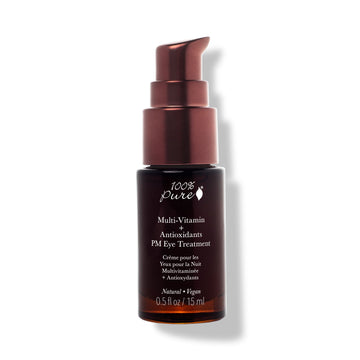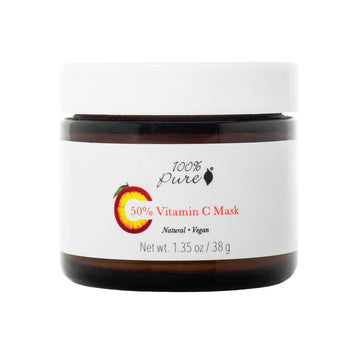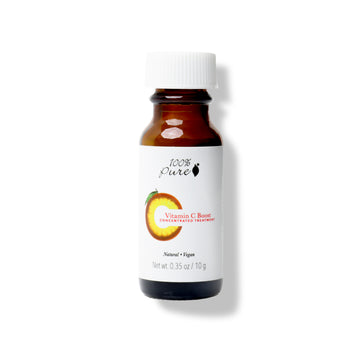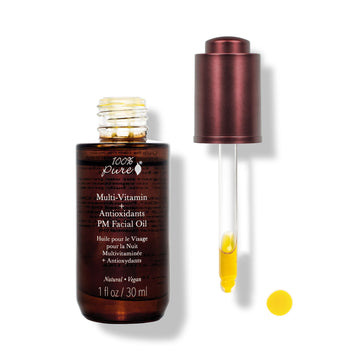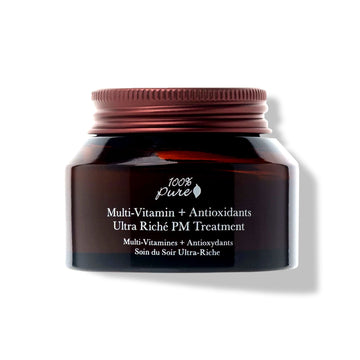Your questions answered on when and the order to apply vitamin C – plus the best products for brighter, firmer skin
Written by: 100% PURE®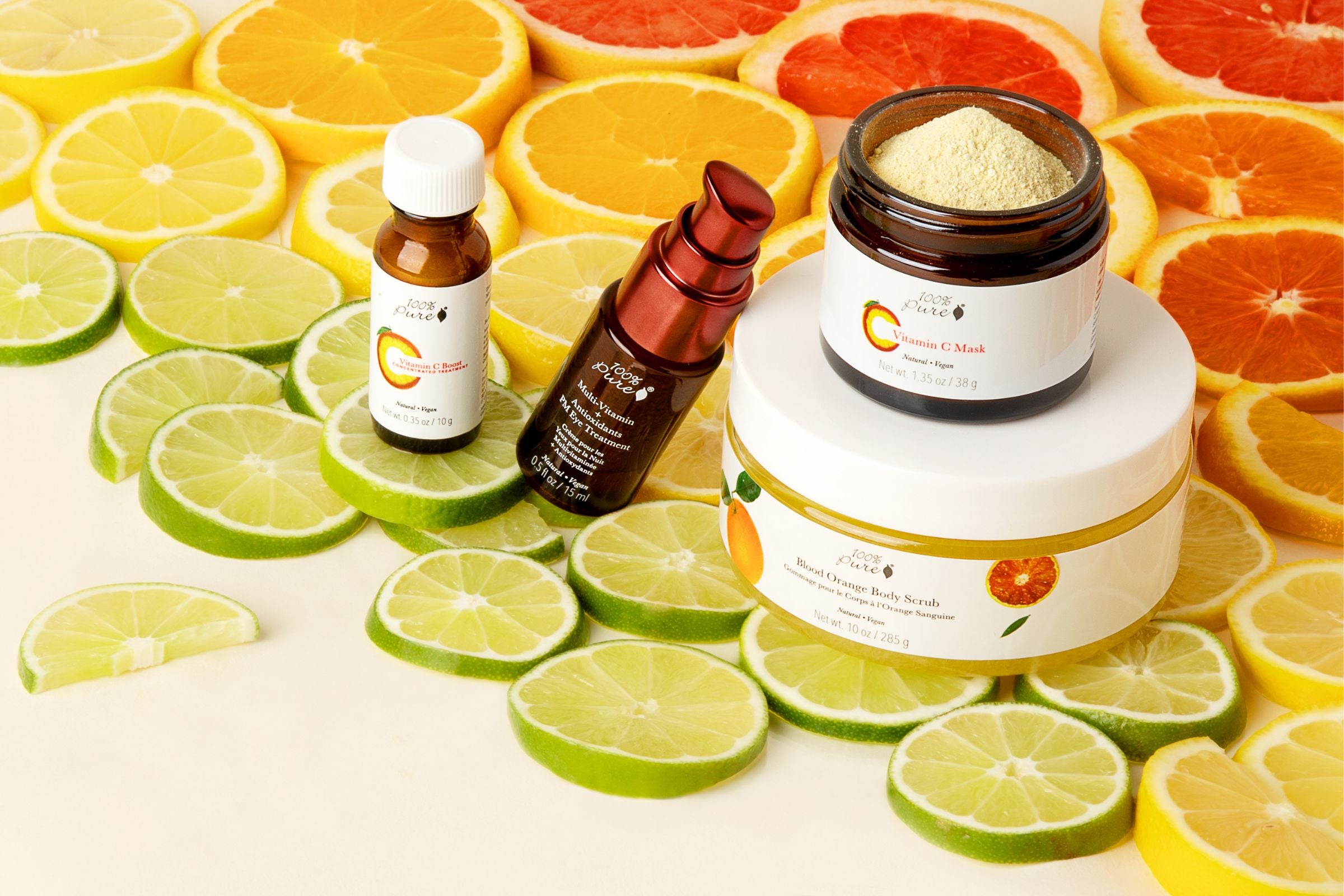
We can never overlook a timeless classic in our skincare routines. Most of the skincare enthusiasts out there know the importance of vitamin C, and for those who don’t – we’re not going to gate-keep keep the benefits of this citrus celeb! But is our skin ready to drink up this potent antioxidant?
As we try new products and make skincare regimen shifts, vitamin C can get lost in the shuffle. Sometimes we forget when to use it, or just how important it is. Let’s take a closer look at vitamin C and see when and how to properly use this superstar ingredient - plus the best products for brighter, youthful skin.
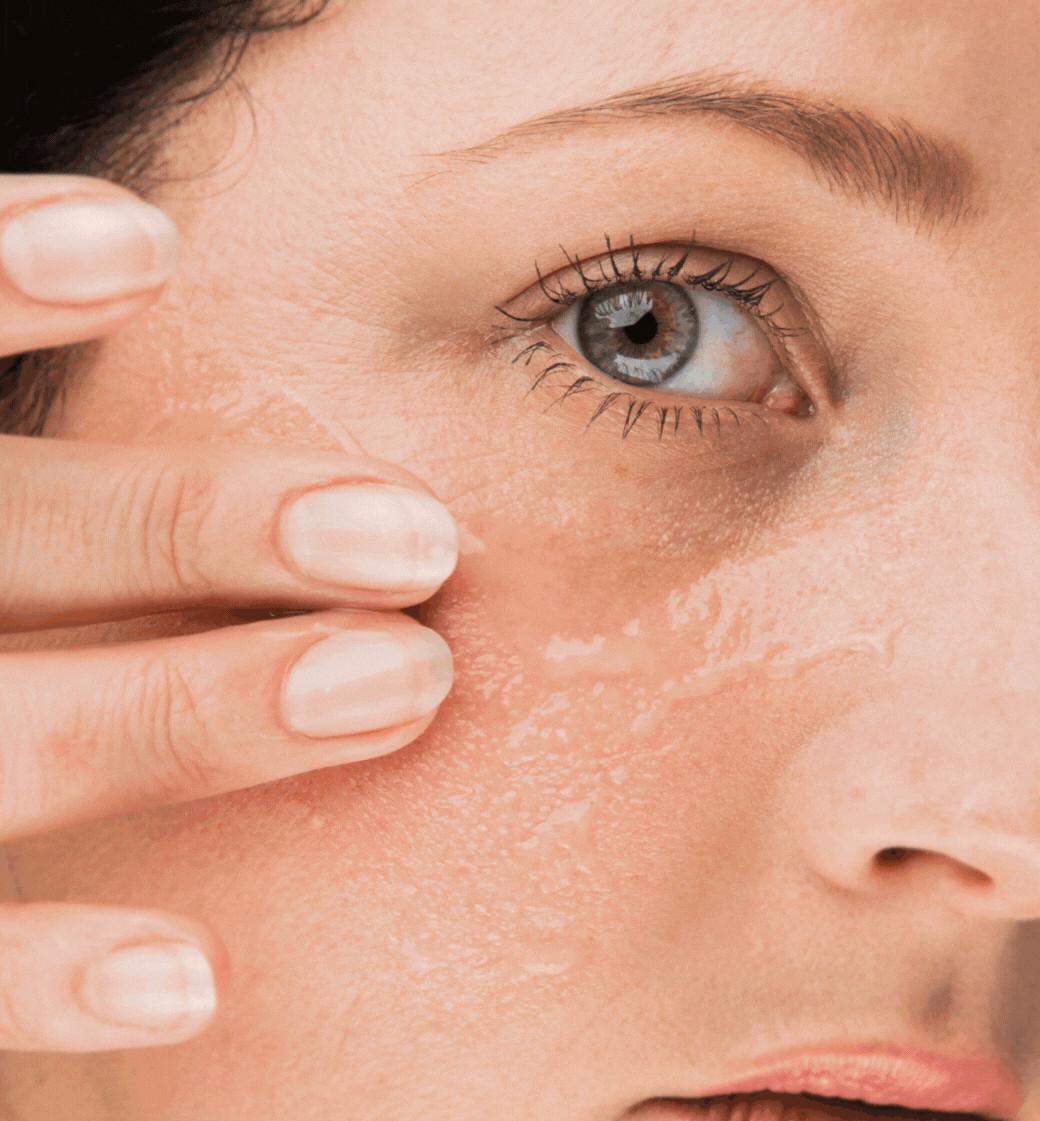
If we could dive into the Fountain of Youth, we imagine we’d be drenched in many beauty benefits. But until we get our VIP access to that mythical fountain, we’ll thank our lucky stars for a certain C-elebrity ingredient. Vitamin C is at the top of that gratitude list! The citrus all-star offers a multitude of youth-boosting benefits.
Vitamin C is a powerful antioxidant that can encourage collagen production for firmer skin, and it increases cell turnover, which means brighter skin and a more even skin tone. It also provides protection against UV assailants, and can even scavenge free radicals to prevent the onset of fine lines and wrinkles. This anti-aging star can reduce hyperpigmentation, helping to keep your skin spot-free.
The A-list vitamin is not just meant for your face; it boasts mega-benefits for your eyes, too. If you wake up to dreaded panda eyes or dark under-eye bags, you can have those bags packing with our Multi-Vitamin + Antioxidant Eye Treatment that features dark-spot banishing vitamin C. Use in the PM to awaken with bright, peppy peepers.
Though a natural skincare arsenal with vitamin C could undoubtedly take your skin routine to the next level, there’s some confusion surrounding the correct use of the ingredient. Questions stay afloat in the skincare world over when to use vitamin C, and the correct order to use it with your other fave natural products. Let’s help answer these questions.

When you build the best natural skincare routine around your vitamin C products, you can better ensure you’re getting the absolute most from the skin superhero. First things first: should you be using the brightening ingredient C-sonal or all year long? Let’s get the lowdown on this so you can keep your products from interfering with its good work.
Generally, vitamin C is safe for daily use. While using it as part of your skincare regimen is smart year-round, it’s especially important to apply it in winter because of the environmental protection it offers. When dry, cool weather can dehydrate skin, vitamin C helps replenish your skin’s natural barrier.
If you find your skin parched from the winter blues, try our revitalizing Vitamin C Mask, which works at the cellular level, to address skin healing and moisture depletion for more supple skin. This customizable mask can be as thick and concentrated or as thin and gentle as you want it, making it suitable for most skin types.
At night, our water-activated powder Vitamin C Boost treatment features just two ingredients: vitamin C and hyaluronic acid. In this blend you’ll find sodium ascorbate, ascorbic acid, and calcium ascorbate for a triple punch of our favorite vitamin. This ultra-concentrated treatment promotes a brighter complexion, while supporting collagen and elastin production for firm, supple skin upon waking.
Newsletter Subscribe
for more blog updates and exclusive discounts
If you’re using a daytime vitamin C serum, we recommend that beauty lovers use it after using a cleanser for your skin type, a toner for your skin, and/or an exfoliant and mask — but always before moisturizing. All you need to do is apply a couple pumps of serum to clean fingers, and gently press the product evenly over damp skin.
Always allow your serum to absorb for 60-90 seconds, to ensure it has time to penetrate the skin. Follow up with a moisturizer and sun protection to lock in the goodness of your serum, and bolster and protect your skin’s protective lipid barrier. Be sure to choose a moisturizer that’s best suited for your skin type.
Our natural vitamin C products can be for day or nighttime use, but it really comes down to your skin type and sensitivity level. However, if you do wear it during the day, you should wear it under a broad- spectrum SPF. Studies have shown that since vitamin C can heighten your sensitivity to the sun, pairing it with sun protection tailored to your skin type can counteract this and may actually boost free radical defense. More on nighttime use of vitamin C below!
Our sunscreen formula collection includes both vitamin C and antioxidant vitamin E to help heal and rejuvenate skin. It also features alpha lipoic acid to promote cellular regeneration and gently resurface skin, and green apple to boost the vibrancy of your complexion.
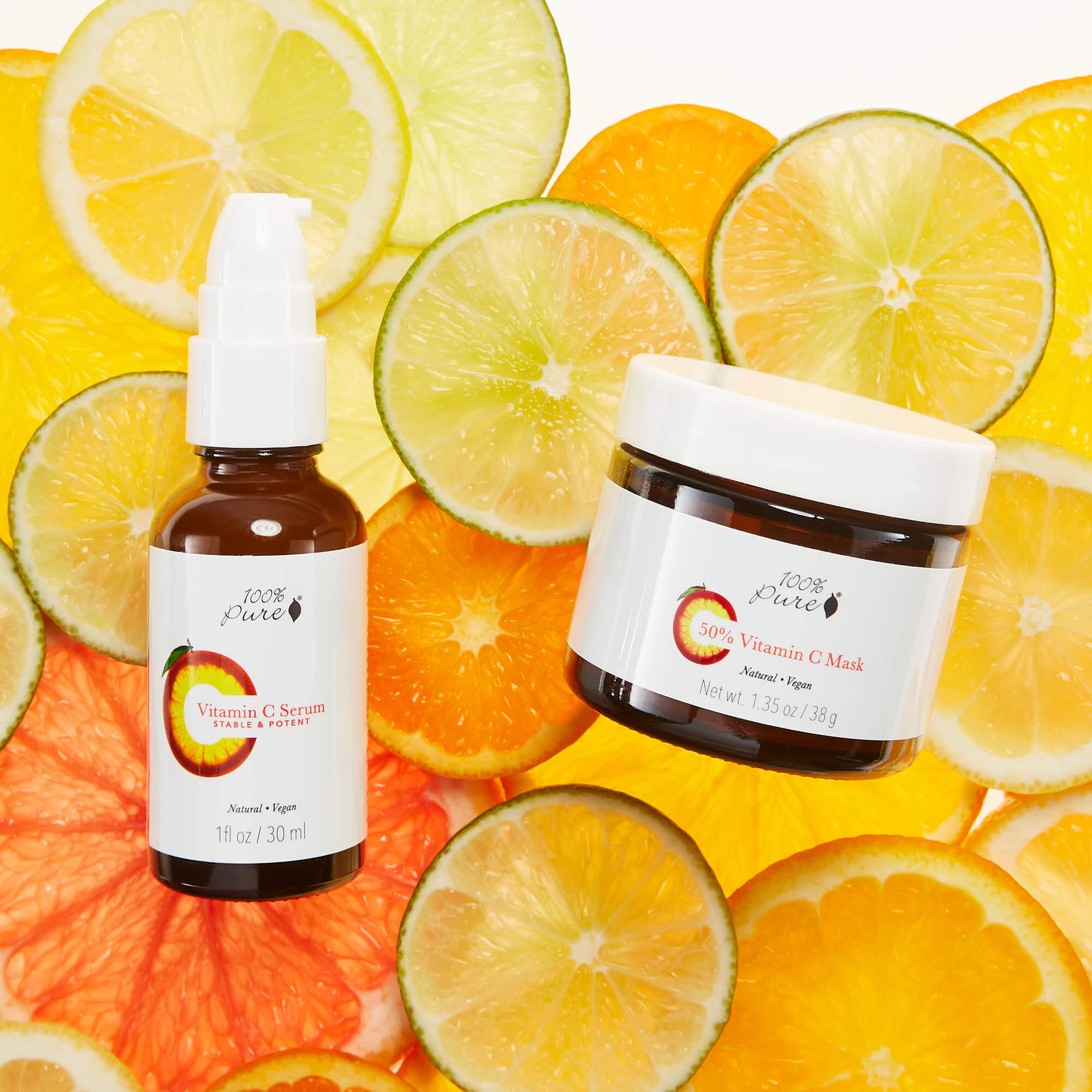
When it comes to using vitamin C products, they should be safe and suitable for daytime use for most skin types – as long as they’re not for nighttime use. But if you have sensitive skin, you might want to steer clear of vitamin C during daytime hours. In some cases, higher concentrations of vitamin C could make sensitive skin more prone to irritation and sunburn.
In fact, if you have extra dry or sensitive skin, you might want to give your skin much needed hydration with cleansing oil. Our Multi-Vitamin + Antioxidant PM Facial Oil features concentrated potencies of vitamins C, E, and D3 and is designed for targeted hydration and anti-aging benefits. All you need to do is apply a couple pumps of oil to clean fingers, and gently press the product evenly over cleansed skin.
If you don’t have skin sensitivities and would just prefer to use vitamin C at night, these next details are for you. When it comes to a PM-only night routine with vitamin C, apply the Multi-Vitamin + Antioxidants Serum after you cleanse and tone your skin. It’s formulated to heal, restore, and renew your skin while you sleep.
For normal-to-dry skin, follow with a protective night cream like our Multi-Vitamin + Antioxidants Ultra Riché PM Treatment. This rich moisturizer will help lock the serum’s nutrients into your skin. This creamy, dreamy, citrus-scented moisturizer makes an impressive centerpiece in any nightly skincare routine – plus it works synergistically with the night serum!
When you’re purchasing vitamin C products, make sure to check the list of ingredients on the packaging to understand what impact the product will have on your skin. Keep an eye on their ingredients’ lists and percentages so you can safely use it for your skin type.
Tip #1:
If a vitamin C product has alpha hydroxy acids or other gentle exfoliants, we recommend using it at night.
Tip #2:
If you do not have sensitive skin, you might be able to pair your fave vitamin C product with retinol. It is contingent on when and how you use your vitamin C and retinol.
Tip #3:
If you have sensitive skin, you might want to steer clear of using vitamin C during the day. Use it at night, and be sure you always wear a broad-spectrum sunscreen during daytime hours.
Tip #4:
High concentrations of vitamin C might be irritating for sensitive skin types or problematic for those with oily skin. Be sure to use vitamin C for your skin type.
If you love vitamin C, you couldn’t have come to a better place! Our vitamin C collection contains a concentrated, stabilized, and easily absorbable form of plant-derived vitamin C. This boosts the potential for safer absorption, better collagen production, and potent antioxidant defense.
At what step in my skincare routine should I apply vitamin C?
If you’re using a daytime vitamin C serum, we recommend that beauty lovers use it after using a cleanser for your skin type, a toner for your skin, and/or an exfoliant and mask — but always before moisturizing. Always allow your serum to absorb for 60-90 seconds, to ensure it has time to penetrate the skin.
How often should vitamin C products be used for optimal skin benefits?
Vitamin C is an antioxidant, making it ideal for daytime use. Using vitamin C in the morning, followed by sunscreen, can amplify your sun protection. While vitamin C is highly effective in the morning, it's also beneficial to use it at night when skin repair is in full swing. Using it in the evening can aid the skin's natural healing process and deliver optimal skin benefits.
Can I combine vitamin C with other skincare ingredients, like retinol or hyaluronic acid?
Using other skincare ingredients together with retinol can provide faster results in improving your skin's texture and appearance, as well as aging concerns. If you have sensitive or reactive skin, and you're using retinol in your nighttime routine, you might consider alternating nights with other skincare ingredients and retinol until you’re sure your skin will not experience increased sensitivities.
Can vitamin C cause any skin reactions or sensitivities when first introduced?
Generally, vitamin C is safe and suitable for daytime use for most skin types. However, if you have sensitive or reactive skin, be sure to check what type and concentration of the vitamin C product you’d like to use to avoid potential skin irritation and sensitivities.
How should I store vitamin C products to maintain their effectiveness?
Store in a cool, dry, and dark place. A cabinet or drawer away from windows will keep it from oxidizing.
Do not store in a car, which could get hot, and can alter the effectiveness of the vitamin C in the product.
Now that you’ve got the lowdown on the vitamin MVP and how to use it, you’re going to notice a boost in elasticity and firmness, with an overall brighter complexion. With all these amazing natural skincare products working synergistically, vitamin glow-getter should certainly be your plus-one (or few) on your skin daily and in your regular skincare routine.
- Tags: how-to, September-2023, Skin Care, skincare
We carefully hand-select products based on strict purity standards, and only recommend products we feel meet this criteria. 100% PURE™ may earn a small commission for products purchased through affiliate links.
The information in this article is for educational use, and not intended to substitute professional medical advice, diagnosis, or treatment and should not be used as such.












